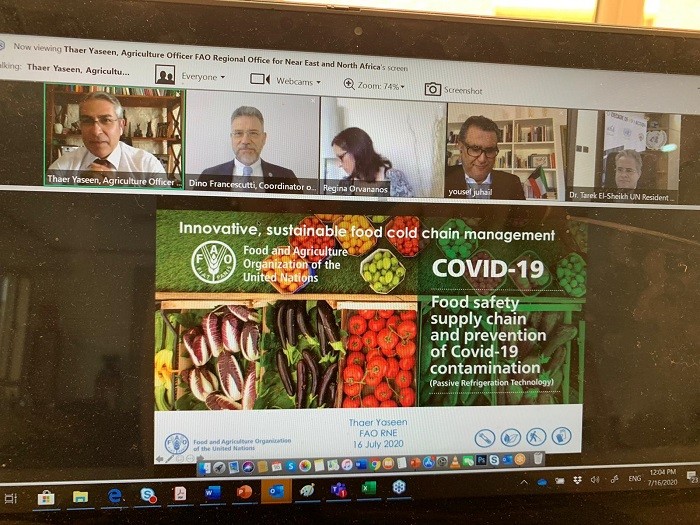The United Nations Resident Coordinator Office in the State of Kuwait and FAO sub-Regional Office for GCC and Yemen, in partnership with Kuwait Foundation for the Advancement of Sciences (KFAS) and the Public Authority Of Agriculture Affairs and Fish Resources (PAAF), organized the third Supply Chain Webinar session on Thursday.
The session, themed “Controlled environment, agriculture, food cold chain logistics and digital technologies,” focused on the negative impacts of the novel coronavirus (Covid-19) pandemic and the role of information technology in mitigating these impacts. The panelists agreed that Covid-19 has caused global disruptions to the food supply chains highlighting the universal concern about food security.
Among many negatively affected, the Government of Kuwait managed to curb the food shortages and keep the supply chains as alive as possible given the unanticipated circumstances, they noted. Dr. Tarek El-Sheikh, the Representative of the UN Secretary-General and Resident Coordinator to the State of Kuwait, emphasized the importance of this continuous discussion in order to stress on the potential of technology examples to effectively tackle challenges in food supply chains.
The webinar also aims to contribute to the collaboration between the Government of Kuwait, the UN with FAO as the mandated agency on the lead in support for developing a national strategy for food security and nutrition. “Covid-19 revealed the fragility of food systems, and the importance for Kuwait to be even more attentive to food and nutrition security,” Dr. El-Sheikh added. “Issues of domestic production, food loss and waste, overweight and obesity and diet-related noncommunicable diseases (NCDs) is receiving a much greater attention.
“Kuwait, likewise, other GCC countries, with the dominating dry climate, land and freshwater scarcity, face limitations in expanding agricultural capacity. Challenges are many; innovative agricultural technologies and solutions are required to enlarge production, distribution and marketing,” he added. Kuwait’s Permanent Representative to FAO Dr. Youssef Juhail expressed satisfaction with working closely with the UN and the government authorities at the national level to ensure establishing an FAO office in Kuwait and enable direct technical expertise and provision of the latest technologies to government institutions. These technologies support the institutions’ strategies and national initiatives in advancing the agriculture and aquaculture process, as an important natural wealth of the State of Kuwait, especially in these times of crisis and to tackle the obstacles and negative impact of Covid-19 pandemic, he pointed out.
Meanwhile, Dr. Dino Francescutti, Sub-Regional Coordinator for GCC and Yemen and FAO Representative in the UAE, highlighted that natural resources sustainability, including water use optimization, among other constraints, challenge Kuwait to look for various strategic options for sustainable food production to both protect the environment and increase food security and enhance nutrition. In these efforts, utilization of innovation technologies is critical; especially the use of those that target increased water productivity such as new generations of greenhouses, agro-aquaculture systems, and others. Now, the technological progress and innovation, through controlled environmental agriculture, allow producing high-quality and nutrient-rich products sustainably almost everywhere, including in the desert and arid areas.
On his part, Dr. Bassam Alfeeli, Director of Innovation and Enterprise at KFAS mentioned that continuing on its role as an enabler and promoter of technological solutions, KFAS issued in last April a special call for practical solutions that could address the implications of the Coronavirus (Covid-19) pandemic on national food security and supply chain disruption.
The goal is to encourage and accelerate the adoption of new technology solutions and/or adaptation of more mature technologies proven elsewhere to Kuwait conditions through funding of pilot projects. Then used these pilot projects to demonstrate and showcase the capabilities and limitations of such applied solutions to the concerned entities.
Dr. Francescutti explained that developing shorter food supply chains through improved food cold chain logistics so as digital platforms, connecting farmers and producers to markets, are becoming important tools. They provide a unique opportunity to extending the shelf life of produces from production to markets and bring greater efficiency, transparency and traceability to the exchange of value and information in the agri-food sector.
The webinar was well attended by various partners from all sectors, government, NGOs, Private Sector, Research Institutions and interested individuals from the public who shared examples and case studies achieving the sole aim of the webinar in exchanging knowledge between the Government, UN and FAO on experiences and best practices related to the topics discussed. This will contribute to the production of a joint policy report on “Managing broken supply chain in the context of Covid-19 in Kuwait,” and a continuous policy dialogue in the area of sustainable agriculture, food security and nutrition. This webinar comes in a timely coincidence with FAO, IFAD, UNICEF, WFP and WHO 2020; the State of Food Security and Nutrition in the World 2020 report, Transforming food systems for affordable healthy diets. This flagship publication is part of the State of World series of the Romebased FAO.

